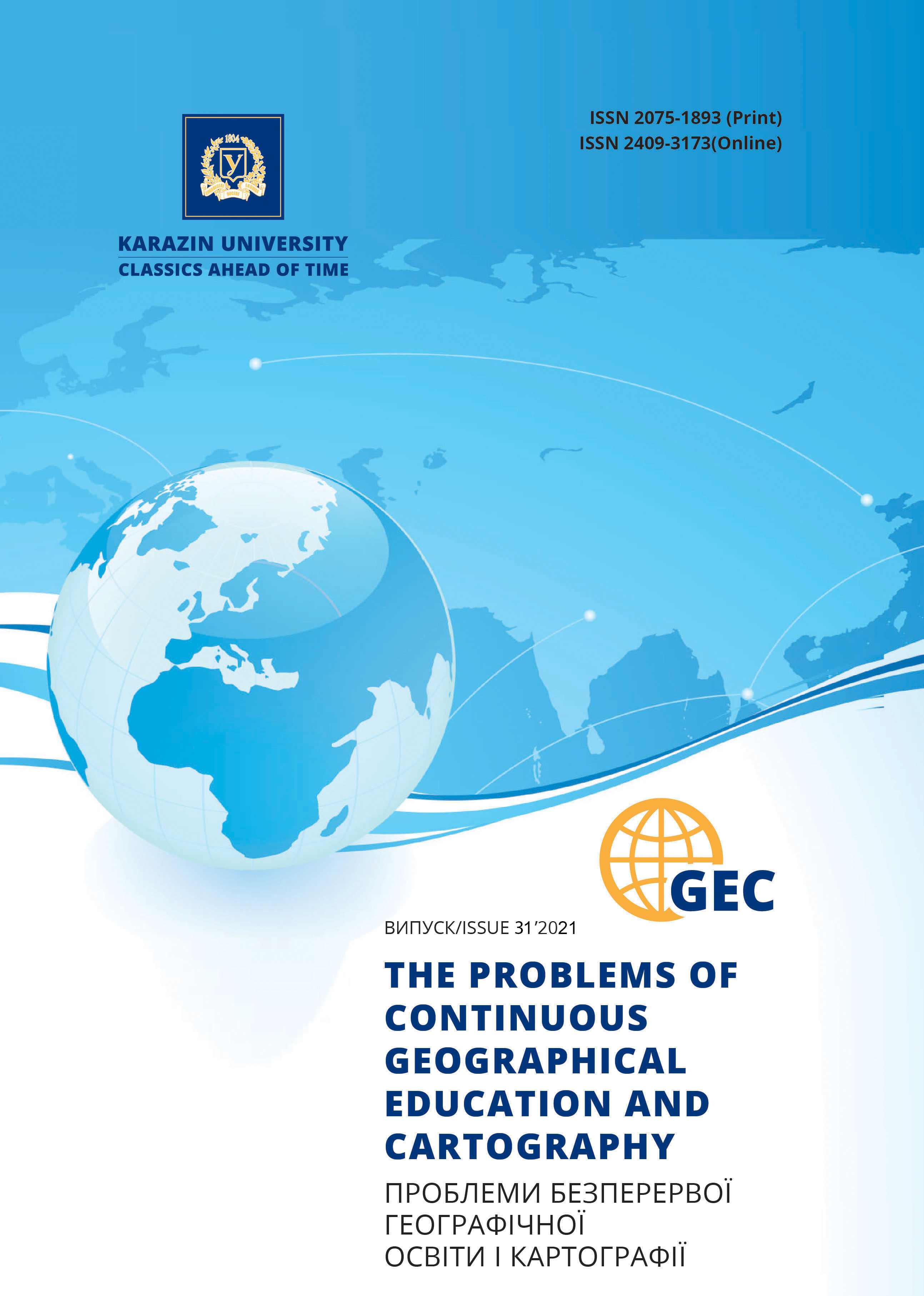Theoretical and methodological fundamentals of use GIS technologies and creation of electronic maps when conducting land management
Abstract
The purpose of this article is to study the use of GIS during land management in the Odessa region.
Main material. The presented article briefly highlights the main problems of using modern information technologies, which are now crucial for economic development, effective management and improving the quality of life. One of the main features of GIS support and automation of land management is the wide range of field geodetic data processing. These include the ability to enter measurement data from paper media, as well as import from electronic storage devices or direct input of coordinates in real time.
As part of the development of geoinformation mapping, it is advisable to allocate a separate area at the intersection of such sciences as geoinformatics, land management and land cadastre, as well as cartography - geoinformation mapping, the essence of which is the automated creation and use of maps as an integral part of land cadastre based on geoinformation technologies and land information geodatabases to solve large-scale problems.
Modern electronic map as a means or tool of knowledge of the landscape of the Earth leads to the creation of secondary, i. e. model, geoinformation. Model cartographic information is determined by analysis and synthesis, as well as by processing primary geoinformation by various mathematical methods. It is used to study natural and anthropogenic phenomena on maps and to create new, derived maps and cartograms for various purposes.
In connection with the increase in demand for such maps in the national economy of Ukraine and in other countries, an objective assessment of the amount of information encoded on these maps becomes especially important.
Conclusions. The use of GIS technologies in solving various land management problems allows to make radical changes in the field of management decisions of various kinds and nature regarding the use of natural resources, environmental protection and environmental safety at different levels.
As a result, the substantiation, structure, methodology and results of the creation of a geoinformation database to ensure the problems of land management in the Odessa region are presented.
Downloads
References
Goty`nyan, B.C., Krasovs`ky`j, G.Ya., Mel`ny`k, I.V. (2007). Geoinformacijni sy`stemy` i texnologiyi [Geoinformation systems and technologies]. Materialy` narady` «Mozhly`vosti suchasny`x GIS/DZZ-texnologij u spry`yanni vy`rishennya problem Luganshhy`ny`» [Materials of the meeting «Opportunities of modern GIS/remote sensing technologies in helping to solve the problems of Luhansk region»], 74-88.
Karpins`ky`j, Yu.A., Lyashheczko, A.A., Volchko, Ye.P. (2006). Strategiya formuvannya nacional`noyi infrastruktury` geoprostorovy`x dany`x v Ukrayini [Strategy of formation of national geospatial data infrastructure in Ukraine]. Ky`yiv: NDIGK, 108.
Lopandja, A.B., Nemtinov, V.A. (2007). Osnovy GIS i cifrovogo tematicheskogo kartografirovanija: Uchebno-metodicheskoe posobie [Fundamentals of GIS and digital thematic mapping: Educational and methodological guide]. Tambov: TGTU, 72.
Dzhos, A.N. (2005). Geoinformacionnye sistemy i bazy dannyh [Geographic information systems and databases]. Lugansk: LNAU, 41.
Dzhos, A.M. (2005). Geoinformacijni sy`stemy` v kadastrovy`x sy`stemax [Geoinformation systems in cadastral systems]. Lugans`k: LNAU, 44.
Zacerkovny`j, V.I., Burachek, V.G., Zheleznyak, O.O., Tereshhenko, A.O. (2017). Geoinformacijni sy`stemy` i bazy` dany`x: Monografiya. Kn. 2 [Geographic information systems and databases: Monograph. Book 2]. Nizhy`n: NDU im. M. Gogolya, 237.
Lyal`ko, V.I., Azimov, O.T., Kuchma, M.D., etc. (2000). Vy`kory`stannya zasobiv dy`stancijnogo zonduvannya Zemli i GIS-texnologij z metoyu ocinky` fitosanitarnogo stanu ta pry`rodnoyi pozhezhnonebezpechnosti lisovy`x masy`viv (na pry`kladi Zony` vidchudzhennya ChAES) [Use of Earth remote sensing and GIS technologies to assess the phytosanitary condition and natural safety of forest areas (on the example of Chernobyl exclusion Zone)]. Materialy` GIS-forumu [Materials of the GIS forum]. Ky`yiv, 73-80.
Opara, V.M., Buzina, I.M., Xajnus, D.D. (2019). Landshaftno-ekologichni doslidzhennya ekosy`stem suchasny`my` metodamy` [Landscape and ecological research of ecosystems using modern methods]. The Problems of Continuous Geographical Education and Cartography, 29, 55-63.
Bolsunovskij, M.A. (2005). Snimki vysokogo razreshenija so sputnikov QuickBird i WorldView. Nastojashhee i budushhee [High-resolution images from QuickBird and WorldView satellites. The present and the future]. Geoprofi, 1, 21-23.
Sinna, O.I. (2011). Landshaftno-ekologichne kartografuvannya regional`nogo rivnya: sutnist` ta suchasni napryamy` [Landscape and ecological mapping of the regional level: the essence and current trends]. The Problems of Continuous Geographical Education and Cartography, 14, 96-100.
Usi gektary` – v odnij sxemi po-odes`ky`[All hectares - in one scheme in Odessa]. Available at: https://propozitsiya.com/ua/usi-gektari-v-odniy-shemi-po-odeski
Svetlichnyj, A.A., Plotnickij, S.V. Geoinformacionnaja baza dannyh ocenki potenciala nitratnogo zagrjaznenija poverhnostnyh i gruntovyh vod [Geoinformation database for assessing the potential of nitrate contamination of surface and ground water]. Available at: https://www.google.com/url?sa=t&rct=j&q=&esrc=s&source=web&cd=&ved=2ahUKEwj2xb29rMjpAhVFlosKHT3_BK0QFjACegQIAhAB&url=http%3A%2F%2Fvisgeo.onu.edu.ua%2Farticle%2Fdownload%2F41097%2F37430&usg=AOvVaw3bxulrPYkzorSp5QUU3fmL
Stojko, N. (2009). Opty`mizaciya zemlekory`stuvannya – nevid'yemna skladova efekty`vnogo zemleustroyu. Yak realizuvaty` yiyi? [Land use optimization is an integral part of effective land management. How to implement it?]. Land Management Bulletin, 2, 37-39.





